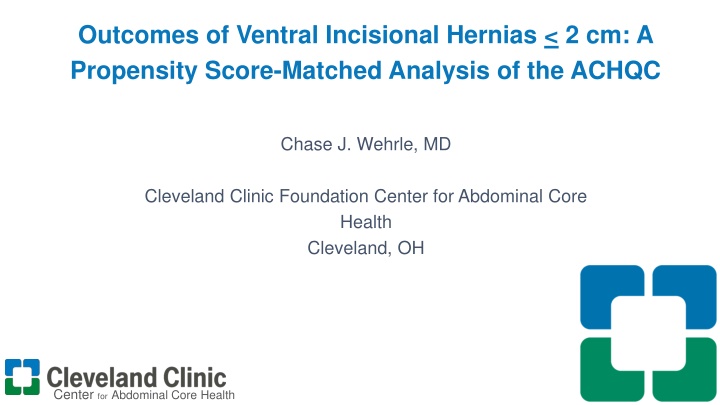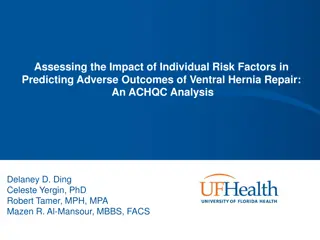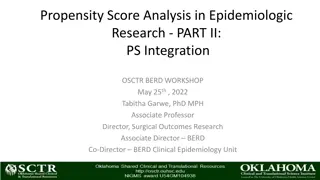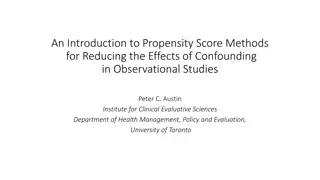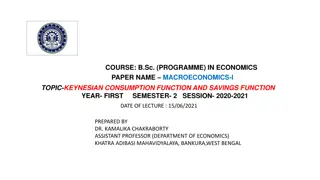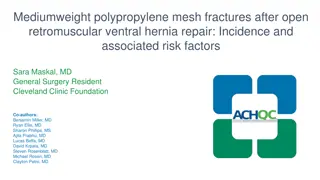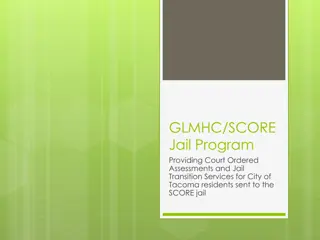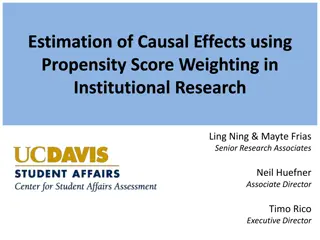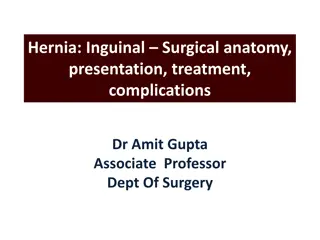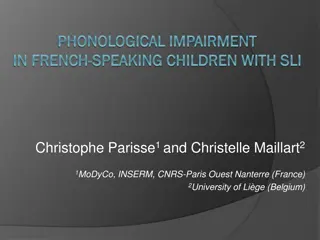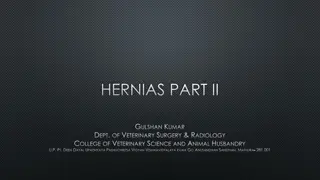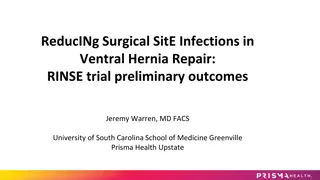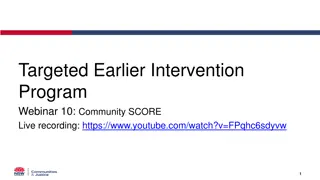Outcomes of Ventral Incisional Hernias <2cm: A Propensity Score-Matched Analysis
This study presents outcomes of ventral incisional hernia repair
Download Presentation

Please find below an Image/Link to download the presentation.
The content on the website is provided AS IS for your information and personal use only. It may not be sold, licensed, or shared on other websites without obtaining consent from the author.If you encounter any issues during the download, it is possible that the publisher has removed the file from their server.
You are allowed to download the files provided on this website for personal or commercial use, subject to the condition that they are used lawfully. All files are the property of their respective owners.
The content on the website is provided AS IS for your information and personal use only. It may not be sold, licensed, or shared on other websites without obtaining consent from the author.
E N D
Presentation Transcript
Outcomes of Ventral Incisional Hernias < 2 cm: A Propensity Score-Matched Analysis of the ACHQC Chase J. Wehrle, MD Cleveland Clinic Foundation Center for Abdominal Core Health Cleveland, OH Center forAbdominal Core Health
Outcomes of Ventral Incisional Hernias < 2 cm: A Propensity Score-Matched Analysis of the ACHQC Chase J. Wehrle, MD Reid Thompson Clayton C. Petro, MD Benjamin T. Miller, MD Ajita S. Prabhu, MD David M. Krpata, MD Michael J. Rosen, MD Li-Ching Huang, PhD Lucas R Beffa, MD Center forAbdominal Core Health
Disclosures Chase J Wehrle, MD: none Reid Thompson: none Clayton C. Petro, MD: BD Consultant; Surgimatrix Consultant Benjamin T. Miller, MD: none Ajita S. Prabhu, MD: CMR Surgical Medical Advisory Board member; Verb Surgical Consulting Fees; Intuitive Surgical, honoraria David M. Krpata, MD: none Michael Rosen, MD: Abdominal Core Health Quality Collaborative- Medical Director, salary support; Ariste Medical- board member, stock options Li-Ching Huang, MD: Abdominal Core Health Quality Collaborative salary support Lucas R. Beffa, MD: Intuitive Surgical, honoraria Center forAbdominal Core Health
Introduction Kaufmann et al. The Lancet. 2018 Mesh reduces recurrence after umbilical hernia repair (1- 4 cm) from 12% to 4% - No difference in QOL between groups Center forAbdominal Core Health
Introduction Kokotovic et al. JAMA. 2016 Ventral Hernia Repair with Mesh Carries a 5% risk of mesh related complication requiring re-operation Similarly found a higher recurrence rate with primary repair Center forAbdominal Core Health
Aim To evaluate the outcomes of repair of small incisional hernias <2 cm No Mesh ? Mesh Complications Recurrence Center forAbdominal Core Health
Methods Adult patients undergoing hernia repair from 2012-2021 were identified from the Abdominal Core Health Quality Collaborative (ACHQC) - Hernias classified as Ventral-Incisional included - Patients with 1-year follow-up included Classified by use of mesh versus primary repair Center forAbdominal Core Health
Methods Outcome Measures: Primary Outcome: Composite Hernia Recurrence - Either clinically detected (exam/imaging) or patient-reported (Yes/no to bulge) Secondary Outcomes: - Post-operative complications - Quality of Life HerQLes Summary: Scored 0-100. Higher scores represent improved abdominal wall-related QOL MCID: 15 points PROMIS-3A Pain Scale: Scored 0-100. Lower represents less pain Nationwide average: 50, Std. Dev: 10 Center forAbdominal Core Health
Methods Propensity Score Matching (2:1 Ratio) BMI (15-60 kg/m2) Diabetes Mellitus Smoking Status Use of Drains Center forAbdominal Core Health
Results 352 patients met inclusion criteria - 276 mesh repairs - 76 primary repairs Median Mesh Length = 9cm, Width=8cm Overall Recurrence Rate: 19.3% (N=68/352) Total Complication Rate: 9% (N=32/352) Center forAbdominal Core Health
Results OUTCOMES Total (N=352) Mesh (N=276) NO MESH (N=76) P-Val 68 (19%) 49 (18%) 19 (25%) 0.16 1-year Recurrence Rate Center forAbdominal Core Health
Results OUTCOMES Total (N=352) Mesh (N=276) NO MESH (N=76 P-Val 68 (19%) 49 (18%) 19 (25%) 0.16 1-year Recurrence Rate 30-day Complications Recurrence 32 (9%) 31 (11%) 1 (1%) 0.008 0.22 1 (0%) 0 (0%) 1 (1%) SSI 5 (1%) 5 (2%) 0 (0%) 0.59 SSO 19 (5%) 18 (7%) 1 (%) 0.075 Reoperation 1 (0%) 1 (0%) 0 (0%) - Readmission 1 (0%) 3 (0%) 0 (0%) - Length of Stay: Median (IQR) 0 (0-0) 0 (0-0) 0 (0-0) - Center forAbdominal Core Health
Results PSM Total (N=203) Mesh (N=132) No Mesh (N=71) P-Val 60 (50-68) 62 (50-68) 58 (47-68) 0.43 Age: Median (IQR) 73 (55%) 24 (34%) Male Gender 0.003 97 (48%) 176 (88%) 119 (92%) 57 (83%) 0.061 White Race 30 (26-34) 31 (27-35) 27 (24-31) BMI (kg/m2): Median (IQR) 0 0 Ascites 0 - 29 (14%) 20 (15%) Diabetes 9 (13%) 0.63 2 (1%0 1 (1%) 1 (1%) Dialysis Dependent 0.65 15 (7%) 8 (6%) 7 (10%) COPD 0.32 9 (4%) 7 (5%) 2 (3%) Immunosuppressant Use 0.41 22 (11%) 14 (11%) 8 (11%) Active Smoking 0.88 ASA Class 0.079 21 (10%) 14 (11%) 7 (10%) 1 119 (59%) 70 (53%) 2 49 (69%) 59 (29%) 46 (35%) 3 13 (18%) 4 (2%) 2 (2%) 4 2 (3%) - - 5 - Center forAbdominal Core Health
Results OUTCOMES - PSM MESH (N=132) NO MESH (N=71) P-Val 0.12 1-year Recurrence Rate 20 (15%) 17 (24%) Center forAbdominal Core Health
Results OUTCOMES - PSM MESH (N=132) NO MESH (N=71) P-Val 0.12 1-year Recurrence Rate 20 (15%) 17 (24%) 30-day Complications 0.017 14 (11%) 1 (1%) Recurrence 0.35 0 (0%) 1 (1%) SSI - 1 (1%) 0 (0%) SSO 0.17 7 (5%) 1 (1%) Reoperation - 0 (0%) 0 (0%) Readmission 0.55 3 (2%) 0 (0%) Length of Stay: Median (IQR) 0 (0-0) 0 (0-0) - Center forAbdominal Core Health
Results OUTCOMES - PSM MESH (N=132) NO MESH (N=71) P-Val HERQLES SUMMARY SCORE Baseline: Median (IQR) 45 (33 74) 42 (28 52) - 30-day 23.3 (-0.83 37.2) 33.3 (-0.83 50.0) P=0.31 Mean Change from Baseline (IQR) 1-year 24.2 (5.0 51.7) 48.3 (3.3 60.0) P=0.28 PROMIS 3A PAIN SCORE Baseline 48 (40-52) 49 (44-52) - 30-day -3.3 (-14.2 0) -2.4 (-8.2 2.7) P=0.34 1-year -9.5 (-18.7 - -2.5) -15.6 (-21.4 0) P=0.59 Center forAbdominal Core Health
Conclusion With limited follow-up and possible Type-II error, mesh repairs likely have lower recurrence rates in incisional hernias < 2cm Although recurrence rates are lower, the use of mesh may increase the rate of complications Center forAbdominal Core Health
Conclusion Quality-of-life should play a key role when measuring outcomes in incisional hernia repairs The decision of mesh versus suture repair should be tailored to patient risk-factors and discussed during pre- operative counselling for incisional hernia < 2cm Center forAbdominal Core Health
